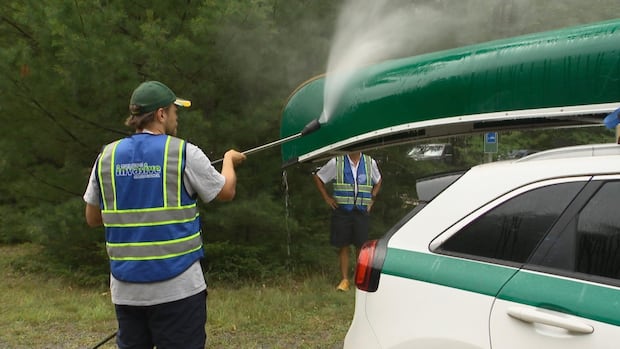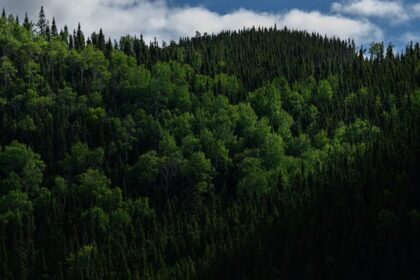Nova Scotia·NewThe free, mobile boat-cleaning service offered by the Nova Scotia Invasive Species Council is intended to protect the province’s lakes and rivers from non-native plants and organisms that could negatively impact the environment.Free initiative by N.S. Invasive Species Council is part cleaning service, part outreach and educationThe decontamination truck has a water tank, a pressure washer and a diesel boiler inside a mobile trailer. (Paul Poirer/CBC)Armed with a water tank, a powerful pressure washer and a diesel boiler, volunteers are visiting popular boating and fishing spots in Nova Scotia, deploying the lethal trio against any invasive species that has dared to hitch a ride on a boat.The free, mobile boat-cleaning service offered by the Nova Scotia Invasive Species Council is intended to protect the province’s lakes and rivers from non-native plants and organisms that could negatively impact the environment.”We’re cleaning boats and watercraft in order to stop invasive species, but we’re also doing outreach and teaching people,” said Ken Donnelly, a supervisor with the council.”Many boaters don’t even realize the risk they’re carrying with them from one lake to another. This is our way of getting ahead of the problem.”The council’s decontamination truck hauls a small blue trailer emblazoned with the words “Prevent The Spread.” Inside, it houses the gear needed to fight invasives: a high-pressure wash to spray the boat, and a boiler that heats water until it’s hot enough to kill invasive species within seconds. The service was briefly on hiatus this summer when the provincial government implemented a ban on entering the woods on Aug. 5 in effort to prevent forest fires during a particularly hot, dry summer. Now that the ban has been partially lifted, the truck has once again hit the road with plans to offer cleanings until late October.Zebra mussels are small freshwater mollusks that can cause big problems for unfamiliar ecosystems. (CBC)A species of particular concern to Donnelly is the zebra mussel, which was introduced to the Great Lakes in the late 1980s, and was more recently found in New Brunswick, which he said poses a big threat to Nova Scotian ecosystems. According to Parks Canada, the tiny striped mussels cause damage by beating out native mussels and other small invertebrates for food. Zebra mussels feast on plankton, removing large amounts of the non-toxic algae, while allowing toxic cyanobacteria to thrive and leading to toxic algae blooms. They are also filter feeders that attach to rocks, affecting fish spawning areas.Earlier this summer, the decontamination truck set up at Jakes Landing, a popular spot for paddlers along the Mersey River in Nova Scotia’s Kejimkujik National Park. While the park is already home to the invasive pickerel fish, a top concern for resource managers is preventing the introduction of other invasive species, like zebra mussels.”They can just be attached to your canoe,” said Brittni Scott, a resource management officer with Parks Canada. “They can tag in and you just might not even notice it.”Ken Donnelly is a supervisor with the Nova Scotia Invasive Species Council. (Paul Poirer/CBC)Apart from the woods ban, local water restrictions have posed a challenge for the cleaning service, as the truck typically refills its tank from rural fire stations. That’s not an option in some areas due to the drought. Donnelly said the council is focused on reaching locations that are both compliant with local and provincial regulations and convenient for boaters.Its most recent location was the Pijinuiskaq Paddle Festival in Bridgewater on Sunday.The truck has not returned to Keji since its visit to Jakes Landing earlier in the summer, but Donnelly said they hope to visit soon.”They’ve been really interested in protecting Keji from aquatic invasive species,” he said. “They’re a really good partner down there.”ABOUT THE AUTHORGiuliana is a journalist originally from Lima, Peru. She is interested in stories about rural Nova Scotia, science, the environment and more. If you have any story tips, you can reach her at giuliana.grillo.de.lambarri@cbc.ca.
Boat wash on wheels aims to stop invasive species in their tracks in N.S.











